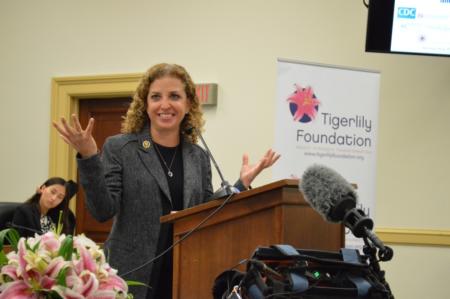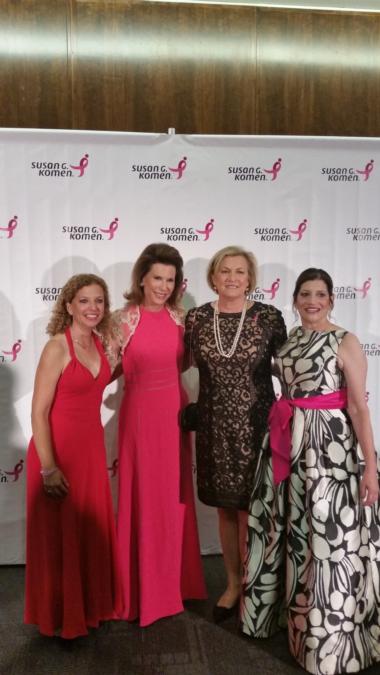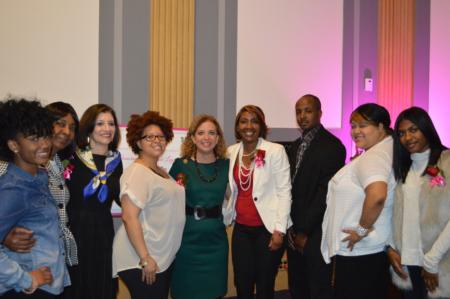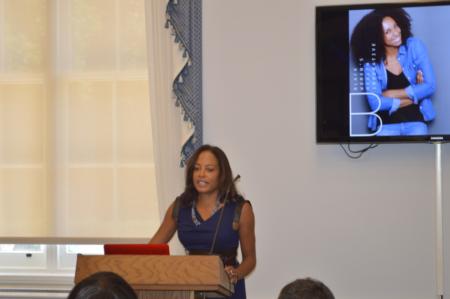Background on Breast Cancer, Rep. Wasserman Schultz's Story, and the EARLY Act
Despite the perception that breast cancer is only something older women need to worry about, young women can, and do, get breast cancer. Sharing this knowledge is critical because young women’s breast cancers are generally more aggressive, are diagnosed at a later stage, and result in lower survival rates. One of the reasons they are diagnosed at a later stage is because many young women don’t think they can get breast cancer - that breast cancer is something that only happens to older women. And even if they do suspect something is wrong, too many physicians dismiss their concerns because they also believe that the woman is too young to have breast cancer.
 |
| Congresswoman Wasserman Schultz speaks at Young Women’s Breast Health Day on June 17, 2015. |
Additionally, certain ethnic groups, including Ashkenazi Jews and young African American women, have an increased risk of breast cancer. Several years ago, I was a young woman at high risk, but didn’t know it. In late 2007, I heard those terrible words, “you have breast cancer.” And for as much as I knew as an advocate in the fight against breast cancer during two decades as a legislator, there was much I didn’t know.
At the time, I did not know that as an Ashkenazi Jew, I was five times more likely to have the BRCA 1 or BRCA2 gene mutation. I did not know that carriers of the BRCA gene mutations have up to an 85 percent lifetime chance of getting breast cancer and up to a 60 percent chance of getting ovarian cancer. After my diagnosis, I found out that I do have the BRCA2 mutation. I was fortunate that I knew enough about my risks and got the help I needed, but I didn’t find my tumor through luck. I found it through knowledge and awareness.
 |
| Congresswoman Wasserman Schultz; Nancy G. Brinker, the Founder and Chair of and Susan G. Komen; Susan Ford Bales, President Gerald Ford’s daughter; and Dr. Judith A. Salerno, M.D., M.S., the President and CEO of Susan G. Komen; attend the Susan G. Komen Honoring the Promise Gala on September 24, 2015. |
We can never say it enough: every woman—especially every young woman—must take charge of her health and do what’s right for her. And if we say it loud enough and often enough, there’s no telling how many women we’ll help. That’s why I introduced the Breast Cancer Education and Awareness Requires Learning Young Act, or the EARLY Act, which became law along with the Affordable Care Act in 2010. The EARLY Act focuses on a central tenet: that we must empower young women to understand their bodies and speak up for their health. It creates an education and outreach campaign that highlights the breast cancer risks facing young women 45 and under, and it empowers them with the tools they need to fight this deadly disease. It helps educate and sensitize health care providers about the specific threats and warning signs of breast cancer in younger women that lead to early detection, diagnosis, and survival.
One component of the EARLY Act is an advisory panel – the Advisory Committee on Breast Cancer in Young Women – at the Centers for Disease Control and Prevention (CDC). This Advisory Panel is providing guidance to the CDC on developing programs to advance understanding and awareness of breast cancer among young women through prevention research, public and health professional education activities, and emerging prevention strategies. In 2011 the CDC awarded seven funding grants to organizations as part of a broader effort to support breast cancer awareness in young women.
 |
| Congresswoman Wasserman Schultz with the family of Henrietta Lacks, whose “HeLa” cells have contributed to the health care of millions of people, at a Susan G. Komen event on March 14, 2016. |
We know that information alone isn’t enough. Young women must also have access to the tools they need to fight this terrible disease. That’s why I introduced and passed the Protecting Access to Lifesaving Screenings Act, or the PALS Act, to help ensure that women get coverage for mammograms starting at age 40.
Looking to the future, I am committed to finding those areas of cancer treatment and awareness that still have such a long way to go, and to working on legislative solutions to fill those voids. When I introduced the EARLY Act, it was a direct result of my own experience with breast cancer. I wanted to make sure that young women facing the same kind of tough decisions that I did would have the support they need.
But as we learn all the time, there is still such a long way to go. More and more young people are getting cancer, and metastasis rates are not going down. That is why I introduced legislation into the Defense Appropriations bill that would create a new task force to study metastatic cancer of all types, focusing on clinical and translational research to extend the lives of patients. This research panel would study stage III and IV of all types of cancer, searching for clues in tumor growth and genetic patterns that different cancers share. When we stop looking at cancer types in silos and focus on what they share, we will make tremendous progress in stopping tumor growth and saving lives!
 |
| Staff from Congresswoman Wasserman Schultz’s office joined the Black Women’s Health Imperative at a briefing on the risks African-American women face from breast cancer. BWHI President and CEO Linda Goler Blount, MPH is pictured above. |
Beyond metastatic cancer, we need to focus on survivorship issues. Patients in their 20s, 30s, and 40s have a completely different experience than patients in their 50s, 60s, or 70s, and it is vital that we recognize and honor and focus on those differences. For young cancer patients, we should be working to help preserve fertility that is often jeopardized as a result of cancer treatment. It is hard enough to be told you have cancer at a young age – but there’s no reason that treating the disease should prevent young women from having children down the road. And the younger that patients are diagnosed with cancer, the longer they will then have to deal with being survivors, presenting a whole new set of physical and psychosocial challenges.
Together, we can save more of our moms, sisters, grandmothers, daughters and sister-friends. So please, help us get a head start by talking to the women in your life today. We must give more women the power to stand up, the power to speak up and the power to survive.
Featured Grantee Success
The EARLY Act has enabled many organizations to increase their invaluable programming and research to support young patients and survivors.
FORCE: Facing Our Risk of Cancer Empowered is using the CDC grant funds to create the new program,
eXamining Relevance of Articles for Young Survivors (XRAYS), which translates scientific articles on emerging breast cancer research into language that is understandable and accessible to the public and will help young breast cancer survivors understand how new research affects their lives and health care decisions.
- In August 2015, FORCE launched XRAYS weekly reviews. Nineteen reviews were published in 2015 and each review was promoted via social media.
- From August 2015-December 31, 2015 the XRAYS reviews had 16,886 unique page views and 10,541 unique users.
- Average time on page for the reviews range from 2 minutes 20 seconds to 4 minutes and 12 seconds.
- The XRAYS quarterly digest was developed and disseminated to an internal list of XRAYS quarterly digest subscribers and through partner organizations (Young Survival Coalition, Living Beyond Breast Cancer, Tigerlily Foundation, Triple Steps Toward the Cure, Young Breast Cancer Survivor Network, the ABOUT Network, and the Michigan Department of Health and Human Services).
Living Beyond Breast Cancer used CDC grant funds to hold two healthcare provider webinars and one half day in-person healthcare provider symposium in 2015. These programs engaged over 500 healthcare providers. These programs covered topics of fertility, sex and intimacy, anxiety and depression, long-term survivorship and young women living with metastatic breast cancer. Recordings of these programs are available
on their website.
In October 2015,
Bring Your Brave expanded its repertoire of personal stories of young women facing breast cancer. Those stories were released in two phases:
- In the first phase, seven new Bring Your Brave cast members were introduced. The stories of these women were featured on the CDC website and across digital platforms. Six video vignettes for two cast members, Cara and Jackie, were promoted via social and paid digital outreach. These two women represented young women in the Ashkenazi Jewish and African American communities as well as the survivor and previvor communities.
- In January 2016, CDC launched a second phase of personal stories with six videos telling the stories of two more of the campaign spokespersons, Carletta and Marleah. These two women represented young women in the Ashkenazi Jewish and African American communities as well as the survivor and previvor communities.






